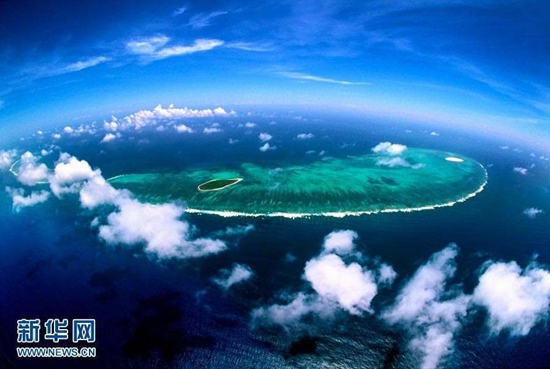

 |
| South China Sea. (Photo/Xinhua) |
The U.S. has recently been hyping the idea that China is militarizing the South China Sea. It first criticized China for deploying missiles in Yongxing Island, then claimed in a report that China is building a radar system on islands or reefs in the Nansha Islands.
However, plenty of evidence suggests that it is the U.S. rather than China who is actually militarizing the South China Sea.
First, the U.S. is clearly “a thief calling on others to catch a thief” when accusing China of escalating militarization in the South China Sea.
It is the U.S. that has been enhancing military deployment in neighboring regions of the South China Sea.
The U.S. not only acquired access to eight military bases in the Philippines, the superpower has also continued increasing its military presence in Singapore and sent warships and aircraft to the South China Sea.
What’s more, it has repeatedly pressured its allies and partners to conduct targeted military drills and patrols to play up regional tension.
Besides selling weaponry to the Philippines, Vietnam and other Southeast Asian countries, the U.S. also repeatedly sent missile destroyers, strategic bombers and anti-submarine patrol aircraft to approach or even enter relevant reefs and islands, as well as the adjacent waters and air space of China’s Nansha and Xisha Islands. Such acts betray ambition to provoke China.
Secondly, the U.S. obviously has a guilty conscience when criticizing China for deploying national defense.
As islands and reefs in the South China Sea have been an indisputable part of China's territory since ancient times, China is entitled to safeguard its legitimate rights and interests.
By deploying necessary defense for its own territory, China is exercising the right of self-preservation granted by international law to sovereign states. This has nothing to do with militarization and is completely legitimate.
China’s defense is not fundamentally different from the defense installation by the U.S. in Hawaii. If other countries have zero intention to threaten China’s sovereignty and security, they needn’t worry about defensive measures.
Thirdly, the U.S. revealed its double standard when criticizing China’s construction on the Nansha Islands.
Such construction falls completely within China’s sovereignty. The light houses built by China on its stationed islands and reefs, as well as the facilities for meteorological observation, emergency shelter and rescue, are public services and goods offered by China to the international community as the largest coastal state in the South China Sea.
They are by no means military facilities, but the U.S. has continued picking on China nonetheless.
In contrast, the U.S. turns a blind eye to military actions taken by the Philippines and Vietnam on the Nansha Islands, which they illegally occupy.
Lastly, so-called “safeguarding navigation freedom” is just a cover-up for the U.S. to destroy peace and stability in the South China Sea.
The U.S. military has been carrying out “navigation freedom” activities for a long time. Such activities, in essence, are challenges to other countries’ sovereignty and jurisdiction in their own waters and exclusive economic zones. The U.S. carries out these activities just to maintain its own maritime supremacy.
The freedom of navigation and flight over the South China Sea, to which all countries are entitled under international law, has never been threatened. Over 100,000 vessels from various countries pass through the region every year without a hitch.
However, the “navigation freedom” actions conducted by the U.S. destroy peace and tranquility in the South China Sea and escalate regional tensions.
Not only won’t this selfish and overbearing act help to peacefully resolve the South China Sea issue, it will further disrupt regional peace and stability.
The U.S. must realize that as a party not concerned in the South China Sea issue, it should respect the efforts of China and concerned nations to peacefully handle their own disputes and safeguard the stability of the region.
If the U.S. intends to make sincere contributions, the best way is to stop stirring up tensions through risky military actions in the South China Sea.
(The author is a research fellow of China's Naval Research Institute)
 2016 Miss Chinatown USA pageant held in San Francisco
2016 Miss Chinatown USA pageant held in San Francisco Ancient pagodas across China
Ancient pagodas across China Beijing Film Academy starts 2016 entrance exam
Beijing Film Academy starts 2016 entrance exam Wedding dress show up in the air
Wedding dress show up in the air Have you ever taken these beautiful subways in China?
Have you ever taken these beautiful subways in China? Russian photographer brings fairytales to life
Russian photographer brings fairytales to life Chinese beauties, foreign models meet in Chengdu
Chinese beauties, foreign models meet in Chengdu Awesome! Aerial pictures taken on J-11 fighter
Awesome! Aerial pictures taken on J-11 fighter A foreign girl explains what China should be proud of
A foreign girl explains what China should be proud of Top 20 hottest women in the world in 2014
Top 20 hottest women in the world in 2014 Top 10 hardest languages to learn
Top 10 hardest languages to learn 10 Chinese female stars with most beautiful faces
10 Chinese female stars with most beautiful faces China’s Top 10 Unique Bridges, Highways and Roads
China’s Top 10 Unique Bridges, Highways and Roads US push leaves China no wiggle room
US push leaves China no wiggle room Don’t let adolescent anger take terrible turn
Don’t let adolescent anger take terrible turn The debate about squatting VS sitting rages on
The debate about squatting VS sitting rages on Family pressure to have second children drives mothers to drop careers
Family pressure to have second children drives mothers to drop careersDay|Week